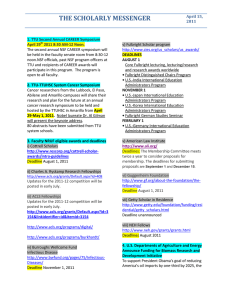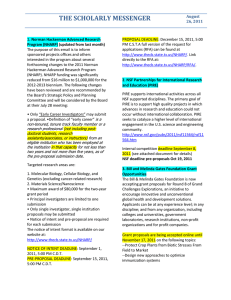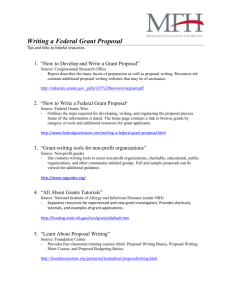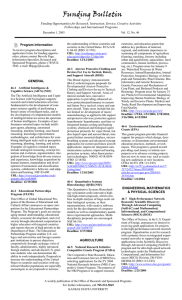Funding Opportunities for Research, Instruction, Service, Creative Activities
advertisement
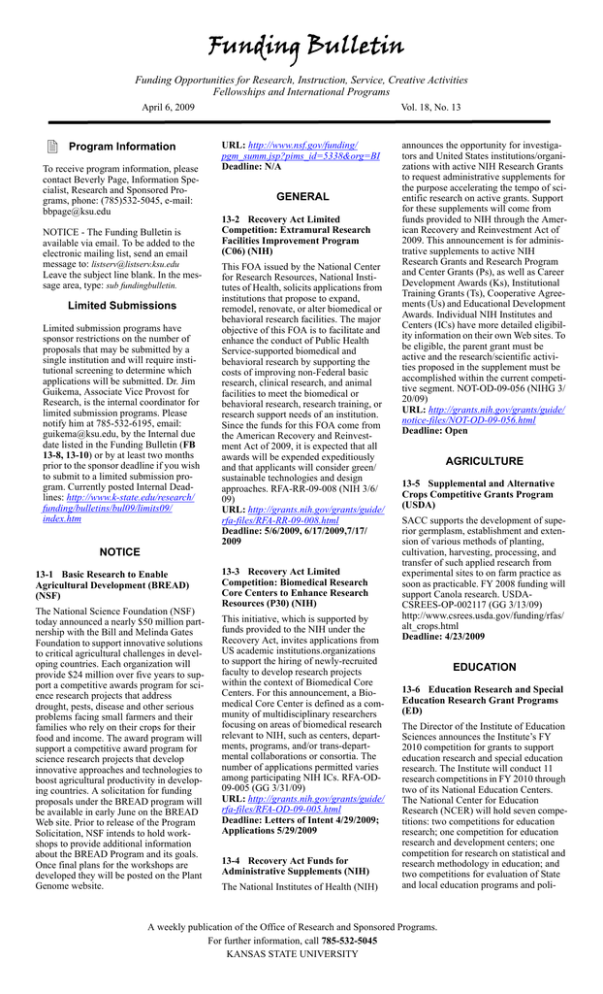
Funding Bulletin Funding Opportunities for Research, Instruction, Service, Creative Activities Fellowships and International Programs April 6, 2009 Program Information To receive program information, please contact Beverly Page, Information Specialist, Research and Sponsored Programs, phone: (785)532-5045, e-mail: bbpage@ksu.edu NOTICE - The Funding Bulletin is available via email. To be added to the electronic mailing list, send an email message to: listserv@listserv.ksu.edu Leave the subject line blank. In the message area, type: sub fundingbulletin. Limited Submissions Limited submission programs have sponsor restrictions on the number of proposals that may be submitted by a single institution and will require institutional screening to determine which applications will be submitted. Dr. Jim Guikema, Associate Vice Provost for Research, is the internal coordinator for limited submission programs. Please notify him at 785-532-6195, email: guikema@ksu.edu, by the Internal due date listed in the Funding Bulletin (FB 13-8, 13-10) or by at least two months prior to the sponsor deadline if you wish to submit to a limited submission program. Currently posted Internal Deadlines: http://www.k-state.edu/research/ funding/bulletins/bul09/limits09/ index.htm Vol. 18, No. 13 URL: http://www.nsf.gov/funding/ pgm_summ.jsp?pims_id=5338&org=BI Deadline: N/A GENERAL 13-2 Recovery Act Limited Competition: Extramural Research Facilities Improvement Program (C06) (NIH) This FOA issued by the National Center for Research Resources, National Institutes of Health, solicits applications from institutions that propose to expand, remodel, renovate, or alter biomedical or behavioral research facilities. The major objective of this FOA is to facilitate and enhance the conduct of Public Health Service-supported biomedical and behavioral research by supporting the costs of improving non-Federal basic research, clinical research, and animal facilities to meet the biomedical or behavioral research, research training, or research support needs of an institution. Since the funds for this FOA come from the American Recovery and Reinvestment Act of 2009, it is expected that all awards will be expended expeditiously and that applicants will consider green/ sustainable technologies and design approaches. RFA-RR-09-008 (NIH 3/6/ 09) URL: http://grants.nih.gov/grants/guide/ rfa-files/RFA-RR-09-008.html Deadline: 5/6/2009, 6/17/2009,7/17/ 2009 NOTICE 13-1 Basic Research to Enable Agricultural Development (BREAD) (NSF) The National Science Foundation (NSF) today announced a nearly $50 million partnership with the Bill and Melinda Gates Foundation to support innovative solutions to critical agricultural challenges in developing countries. Each organization will provide $24 million over five years to support a competitive awards program for science research projects that address drought, pests, disease and other serious problems facing small farmers and their families who rely on their crops for their food and income. The award program will support a competitive award program for science research projects that develop innovative approaches and technologies to boost agricultural productivity in developing countries. A solicitation for funding proposals under the BREAD program will be available in early June on the BREAD Web site. Prior to release of the Program Solicitation, NSF intends to hold workshops to provide additional information about the BREAD Program and its goals. Once final plans for the workshops are developed they will be posted on the Plant Genome website. 13-3 Recovery Act Limited Competition: Biomedical Research Core Centers to Enhance Research Resources (P30) (NIH) This initiative, which is supported by funds provided to the NIH under the Recovery Act, invites applications from US academic institutions.organizations to support the hiring of newly-recruited faculty to develop research projects within the context of Biomedical Core Centers. For this announcement, a Biomedical Core Center is defined as a community of multidisciplinary researchers focusing on areas of biomedical research relevant to NIH, such as centers, departments, programs, and/or trans-departmental collaborations or consortia. The number of applications permitted varies among participating NIH ICs. RFA-OD09-005 (GG 3/31/09) URL: http://grants.nih.gov/grants/guide/ rfa-files/RFA-OD-09-005.html Deadline: Letters of Intent 4/29/2009; Applications 5/29/2009 13-4 Recovery Act Funds for Administrative Supplements (NIH) The National Institutes of Health (NIH) announces the opportunity for investigators and United States institutions/organizations with active NIH Research Grants to request administrative supplements for the purpose accelerating the tempo of scientific research on active grants. Support for these supplements will come from funds provided to NIH through the American Recovery and Reinvestment Act of 2009. This announcement is for administrative supplements to active NIH Research Grants and Research Program and Center Grants (Ps), as well as Career Development Awards (Ks), Institutional Training Grants (Ts), Cooperative Agreements (Us) and Educational Development Awards. Individual NIH Institutes and Centers (ICs) have more detailed eligibility information on their own Web sites. To be eligible, the parent grant must be active and the research/scientific activities proposed in the supplement must be accomplished within the current competitive segment. NOT-OD-09-056 (NIHG 3/ 20/09) URL: http://grants.nih.gov/grants/guide/ notice-files/NOT-OD-09-056.html Deadline: Open AGRICULTURE 13-5 Supplemental and Alternative Crops Competitive Grants Program (USDA) SACC supports the development of superior germplasm, establishment and extension of various methods of planting, cultivation, harvesting, processing, and transfer of such applied research from experimental sites to on farm practice as soon as practicable. FY 2008 funding will support Canola research. USDACSREES-OP-002117 (GG 3/13/09) http://www.csrees.usda.gov/funding/rfas/ alt_crops.html Deadline: 4/23/2009 EDUCATION 13-6 Education Research and Special Education Research Grant Programs (ED) The Director of the Institute of Education Sciences announces the Institute’s FY 2010 competition for grants to support education research and special education research. The Institute will conduct 11 research competitions in FY 2010 through two of its National Education Centers. The National Center for Education Research (NCER) will hold seven competitions: two competitions for education research; one competition for education research and development centers; one competition for research on statistical and research methodology in education; and two competitions for evaluation of State and local education programs and poli- A weekly publication of the Office of Research and Sponsored Programs. For further information, call 785-532-5045 KANSAS STATE UNIVERSITY cies. The National Center for Special Education Research (NCSER) will hold four competitions: Two competitions for special education research, one competition for special education research training, and one competition for special education research and development centers. (FR 3/23/09) http://ies.ed.gov/funding Deadline: Letters of Intent 4/27/2009, 8/3/2009; Proposals 6/25/2019, 10/1/ 2009 13-7 Undergraduate International Studies and Foreign Language Program (ED) The Undergraduate International Studies and Foreign Language (UISFL) Program provides grants to strengthen and improve undergraduate instruction in international studies and foreign languages. The priority is: Applications that a) require entering students to have successfully completed at least two years of secondary school foreign language instruction; b) require each graduating student to earn two years of postsecondary credit in a foreign language or to have demonstrated equivalent competence in the foreign language; or c) in the case of a two-year degree granting institution, offer two years of postsecondary credit in a foreign language. CFDA 84.016A (FR 3/31/09) URL: http://www.ed.gov/news/fedregister Deadline: 4/30/2009 ENGINEERING, MATHEMATICS & PHYSICAL SCIENCE 13-8 Instrumentation for Materials Research—Major Instrumentation Projects (NSF) The Instrumentation for Materials Research-Major Instrumentation Project (IMR-MIP) program in the Division of Materials Research provides support for the design and construction of major instruments costing more than $4 million but less than $20 million. The program also supports the development of detailed conceptual and engineering design for new tools for materials preparation or characterization at major user facilities. The program supports two types of awards: Conceptual and Engineering Design (CED) awards and Construction (CNST) awards. A CED award will enable the proposer to do the necessary engineering design of the instrument. A CNST proposal may only be submitted after a satisfactory engineering design of the instrument has been completed and has been approved by both the facility at which the instrument will be situated and by NSF. An institution may submit at most one IMR-MIP proposal in a given year. NSF 09-547 (GG 3/27/09) URL: http://www.nsf.gov/publications/ pub_summ.jsp?ods_key=nsf09547 Deadline: Internal 4/29/2009; Proposals 6/29/2009 13-9 Climate Modeling: Simulating Climate at Regional Scale (DOE) The Office of Biological and Environmental Research (BER) of the Office of Science (SC), U.S. Department of Energy (DOE), announces interest in receiving applications for research grants on the topic of simulating climate at regional scales. Applications should describe research projects supporting the development of climate models for getting high fidelity simulations of regional climate. High risk, high pay-off research ideas that explore innovative new directions are encouraged; they should clearly describe how the proposed ideas have the potential to lead to breakthroughs in modeling of climate at ultra-high spatial resolutions. DE-PS02-09ER09-15 (GG 3/26/09) URL: http://www07.grants.gov Deadline: 4/27/2009 13-10 Chemistry Research Instrumentation and Facilities: Departmental Multi-user Instrumentation (NSF) The Chemistry Research Instrumentation and Facilities Program (CRIF) is structured to enable the National Science Foundation’s Division of Chemistry to respond to a variety of needs for infrastructure that promotes research and education in areas traditionally supported by the Division. The Departmental MultiUser Instrumentation component of CRIF (CRIF:MU) provides funds to universities, colleges, and consortia thereof for the purchase of multi-user instruments. Up to an additional $100,000, including indirect cost, may be requested for personnel who are needed to support cyberenhanced projects if the instrument is cyber-enabled. The principal investigator must be the chemistry department chairperson or equivalent. The limit on the number of proposals per organization is one. NSF 09-546 (GG 3/19/09) URL: http://www.nsf.gov/pubs/2009/ nsf09546/nsf09546.htm Deadline: Internal 4/23/2009; Proposals 6/23/2009 SOCIAL SCIENCES 13-12 Recovery Act S.T.O.P Violence Against Women Act (VAWA) (KS) This grant program is available from the Federal American Recovery and Reinvestment Act. Funds from Recovery Act S.T.O.P. VAWA will be used to hire and retain criminal justice and victim services personnel who respond to violent crimes against women, as well as supporting other strategies that create and preserve jobs and promote economic growth while improving responses to domestic violence, dating violence, sexual assault and stalking. This is a one-time grant opportunity and funds will be awarded for a 24month period. URL: http://www.governor.ks.gov/grants/ default.htm Deadline: 4/27/2009 13-13 Incorporating Cost-Effectiveness Analysis Into Factors Affecting Quality-of-Life Health Related Research (R01) (NIH) This Funding Opportunity Announcement (FOA) issued by the National Institute of Nursing Research (NINR), the National Cancer Institute (NCI), and the Office of Dietary Supplements (ODS), National Institutes of Health, solicits Research Project Grant (R01) applications to study cost-effectiveness of interventions that will improve health outcomes. The focus on the use of cost-effectiveness analysis is necessary in order to expand the knowledge base, increase awareness of the value of cost-effectiveness utilization, and to identify the next steps for incorporating cost-effectiveness analysis into translational research and patient-focused interventions pertinent to health-related quality of life. RFA-NR-09-005 (NIHG 3/ 20/09) URL: http://grants.nih.gov/grants/guide/ rfa-files/RFA-NR-09-005.html Deadline: Letters of Intent 4/18/2009; Applications 5/18/2009 13-11 EarthScope (NSF) R.W. Trewyn, Vice President for Research EarthScope is an Earth science program to explore the 4-dimensional structure of the North American continent. The EarthScope Program provides a framework for broad, integrated studies across the Earth sciences, including research on fault properties and the earthquake process, strain transfer, magmatic and hydrous fluids in the crust and mantle, plate boundary processes, large-scale continental deformation, continental structure and evolution, and composition and structure of the deep-Earth. In addition, EarthScope offers a centralized forum for Earth science education at all levels and an excellent opportunity to develop cyberinfrastructure to integrate, distribute, and analyze diverse data sets. NSF 09-535 URL: http://www.nsf.gov/pubs/2009/ nsf09535/nsf09535.html Deadline: 7/16/2009, 7/16/2010 Jim Guikema, Associate Vice President for Research Caron Boyce, Administrative Specialist Preaward Section Paul Lowe, Director Anita Fahrny, Assistant Director Kathy Tilley, Rich Doan, Carmen Garcia, Danielle Brunner, Rex Goff, Adassa Roe, Sharon Zoeller Funding Information Specialist & Editor Beverly Page Development Director Mary Lou Marino Human Subjects, Animal Care & Use, and Biosafety Gerald P. Jaax, Associate Vice President, Research Compliance Heath Ritter, Compliance Monitor Adrian Self, Administrative Specialist Congressional Relations Sue Peterson, R.W. Trewyn A weekly publication of the Office of Research and Sponsored Programs. For further information, call 785-532-5045 KANSAS STATE UNIVERSITY

